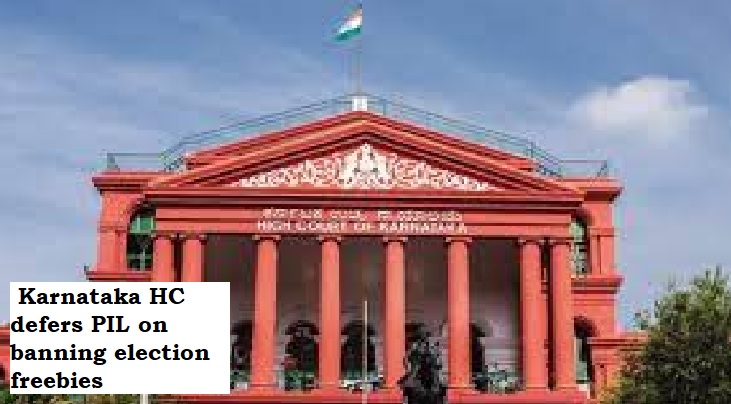


The Karnataka High Court, in a recent development, has deferred the hearing on a public interest litigation (PIL) for a period of 12 weeks. The PIL, filed by retired Brigadier Ravi Muniswamy and others, seeks legal action against the announcement of election freebies during Loksabha and assembly elections. The division bench, comprising Chief Justice Prasanna B Varale and Justice Krishna S Dixit, adjourned the matter, citing its pending status before the Supreme Court.
The bench emphasized that despite having opinions and reservations on the issue, they were refraining from issuing any notices at the moment. The judges expressed their decision to await the outcome of the Supreme Court proceedings before taking any further action. The case will be listed for the next hearing after a period of 12 weeks.
The essence of the PIL revolves around urging the authorities, particularly the Election Commission, to take legal action against the practice of announcing freebies during election campaigns. The petitioners contend that such announcements, often seen as inducements, amount to a form of "cash for votes" under the provisions of the Representation of Peoples Act. The petition argues that political parties have developed a trend of using these freebies as a means to gain power.
One of the key aspects of the PIL is the demand for the Election Commission to establish clear guidelines regarding election freebies. The petitioners propose that these guidelines should align with constitutional principles and socio-economic considerations. To ensure a comprehensive approach, they recommend consulting expert economists and the finance department in framing these guidelines.
The petition asserts that the declaration of freebies prior to elections disrupts the electoral process by influencing voters through material incentives. It further contends that this practice not only compromises the fairness of the elections but also has severe consequences for the country's economy. The argument is grounded in the belief that the prevalence of election freebies leads to a distorted economic landscape, creating various problems for the populace.
In light of these concerns, the PIL seeks a specific direction to the Union Government to promptly formulate necessary laws and rules pertaining to the assurance or announcement of freebies during election campaigns. The plea emphasizes the urgency of this directive to prevent the continuation of the practice. As an interim measure, the petition calls for an immediate halt to the distribution of freebies by candidates or political parties until a comprehensive legal framework is established.
The underlying premise of the PIL is rooted in the belief that unchecked election freebies not only undermine the democratic process but also have far-reaching implications on the economic well-being of the nation. By addressing the matter through legal avenues, the petitioners aim to bring about a systemic change in the way election campaigns are conducted, ensuring fairness, transparency, and the overall integrity of the electoral process. The deferred hearing indicates that the judiciary is keen on aligning its decision with the parallel proceedings in the Supreme Court, highlighting the significance and complexity of the issue at han
TAGS: Justice Krishna S Dixit Supreme Court Inducements Cash for votes Representation of Peoples Act Political parties